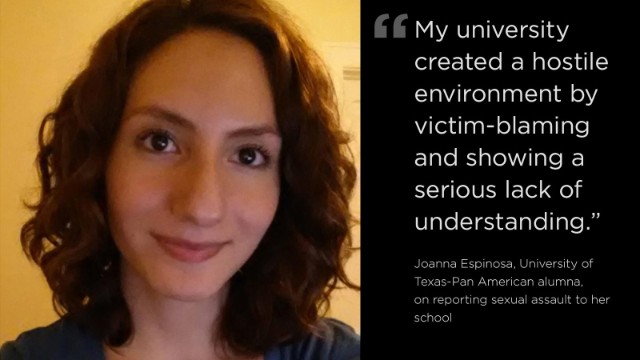Student-led activists movement fights to end rape on campus - CNN.com
The number of complaints to the U.S. Department of Education's Office of Civil Rights about sexual violence at colleges has grown in recent years. So far, the office has received 16 complaints for fiscal year 2014, which began October 1, 2013. It has 39 pending Title IX investigations involving allegations of sexual violence at postsecondary schools.
Here's a look back at the the number of Title IX complaints related to sexual violence for the past five years:
2013: 30 complaints
2012: 17 complaints
2011: 18 complaints
2010: 11 complaints
2009: 11 complaints
Ending rape on campus: Activism takes several forms
updated 7:47 PM EST, Sun February 9, 2014
STORY HIGHLIGHTS
- Nationwide network helps sex assault survivors file federal complaints against schools
- Survivors say schools are violating federal civil rights laws by creating hostile environment
- Schools accused of mistreating students, failing to conduct inquiries in timely manner
- "There's not a single school that isn't thinking about this," professor says
(CNN) -- For a long time, Joanna Espinosa struggled to make sense of it all.
Yes, he was her boyfriend. No, he hadn't pinned her down, or threatened violence. But Espinosa insists that he coerced her, psychologically and physically, into having sex against her will for most of their three-year relationship. She resisted, told him no, pushed him away. More often than not, he persisted and she gave in "just to get it over with," she says.
"I knew that it was sexual assault, but at the time, I felt extreme shame and was not ready nor willing to fully accept what was happening," said Espinosa, 24. "Like most unpleasant truths, I buried it until the end of my relationship, when I realized I was holding onto a relationship with a man who was abusive."
The relationship came to an end in February 2013. The next month, Espinosa filed a sexual harassment claim against her former boyfriend with her school, the University of Texas-Pan American, where some of the incidents occurred.
She says she went to the school first because she thought that without concrete evidence law enforcement would not take her seriously -- a common experience among people who report rape to law enforcement, experts say. Besides, she knew that colleges and universities are federally mandated to investigate sexual violence under Title IX, a federal civil rights law that guarantees students the right to an education free of sexual violence, which is considered a form of discrimination.
Here's a look back at the the number of Title IX complaints related to sexual violence for the past five years:
2013: 30 complaints
2012: 17 complaints
2011: 18 complaints
2010: 11 complaints
2009: 11 complaints
Indeed, when she went to the city of Edinburg Police Department a few days later, she says they told her that her case would be difficult to prove and took her phone number. She never heard back from them, she says.
Her experience with UTPA administrators was no better, she says. At various stages of the investigation, they questioned why she did not come forward sooner with the abuse claims, suggesting she was acting out as a spiteful ex-girlfriend. In one meeting, she says, administrators asked whether their relationship was "Facebook official" or whether there was a "promise of marriage."
It took five months for school administrators to reach the conclusion that Espinosa's complaint was "unsubstantiated." They did, however, conclude her ex-boyfriend abused his access to university facilities, and placed him on disciplinary probation for the remainder of his academic career, according to documents provided by Espinosa.
Joanna Espinosa
Espinosa's voice quivers as she recalls the ordeal, which led her in 2013 to drop one class in the first summer session and request an incomplete in the second.
It was a punch in the gut after sleepless nights and constant self-doubt, she said. She believes the school violated her civil rights by mishandling the complaint and creating a sexually hostile environment.
This week, Espinosa filed a complaint with the Department of Education's Office of Civil Rights alleging violations of Title IX.
A UTPA spokeswoman said the school had not seen Espinosa's complaint, but noted the school does not comment on pending investigations.
Espinosa's complaint makes UTPA the latest school to face criticism for its handling of a sexual assault report. So far in fiscal year 2014, the Department of Education's Office of Civil Rights says it has received 16 complaints that included Title IX allegations specifically related to sexual violence.
Those numbers come on the heels of a marked year-to-year increase in complaints the department received, from 17 in 2012 to 30 in 2013.
The U.S. Department of Education laid out minimal requirements in a 2011 "Dear Colleague" letter for schools to follow in responding to reports of sexual harassment, or risk loss of federal funding.
The 19-page letter reminded schools that under Title IX, which prohibits discrimination on the basis of sex, colleges and universities must apply a "preponderance of evidence" standard to reviewing rape cases, which means they must operate under the assumption that "more likely than not that sexual violence occurred."
Now, many are under scrutiny from the federal government. The U.S. Department of Education's Office of Civil Rights has 35 pending Title IX investigations involving allegations of sexual violence at schools such as the University of North Carolina, Princeton, Harvard, Swarthmore, the University of Southern California, Dartmouth and Occidental, a Department of Education spokesman told CNN.
Rape is a longstanding issue on college campuses, but the latest movement, led by student activists, survivors and faculty, recasts sexual violence as a cultural problem on campuses nationwide -- not just a series of isolated incidents.
Students are taking matters into their own hands, filing complaints en masse and speaking out publicly.
They've flocked to advocacy groups such as End Rape on Campusand Know Your IX, which sprang from grassroots activism around university handling -- or mishandling -- of sexual violence.
President Barack Obama recently called the nationwide, student-led movement a catalyst for a federal task force to protect college students from sexual violence on campus.
The bravery of students who've spoken out -- and their ability to connect to each other through social media -- has sparked a paradigm shift on campuses, said Gina Smith, an attorney who has consulted with schools around the country on sexual assault policy.
"What we're seeing is a demand that schools treat complainants with compassion," Smith said. "Schools are stepping up and taking notice."
From one campus to the next, the concerns are mostly the same, said sexual assault policy consultant Leslie Gomez: lack of clarity, students being mistreated, complex procedures and insufficient training among those leading the processes.


No comments:
Post a Comment